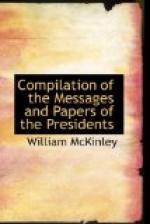The Government should construct and maintain these reservoirs as it does other public works. Where their purpose is to regulate the flow of streams, the water should be turned freely into the channels in the dry season to take the same course under the same laws as the natural flow.
The reclamation of the unsettled arid public lands presents a different problem. Here it is not enough to regulate the flow of streams. The object of the Government is to dispose of the land to settlers who will build homes upon it. To accomplish this object water must be brought within their reach.
The pioneer settlers on the arid public domain chose their homes along streams from which they could themselves divert the water to reclaim their holdings. Such opportunities are practically gone. There remain, however, vast areas of public land which can be made available for homestead settlement, but only by reservoirs and main-line canals impracticable for private enterprise. These irrigation works should be built by the National Government. The lands reclaimed by them should be reserved by the Government for actual settlers, and the cost of construction should so far as possible be repaid by the land reclaimed. The distribution of the water, the division of the streams among irrigators, should be left to the settlers themselves in conformity with State laws and without interference with those laws or with vested rights. The policy of the National Government should be to aid irrigation in the several States and Territories in such manner as will enable the people in the local communities to help themselves, and as will stimulate needed reforms in the State laws and regulations governing irrigation.
The reclamation and settlement of the arid lands will enrich every portion of our country, just as the settlement of the Ohio and Mississippi valleys brought prosperity to the Atlantic States. The increased demand for manufactured articles will stimulate industrial production, while wider home markets and the trade of Asia will consume the larger food supplies and effectually prevent Western competition with Eastern agriculture. Indeed, the products of irrigation will be consumed chiefly in upbuilding local centers of mining and other industries, which would otherwise not come into existence at all. Our people as a whole will profit, for successful home-making is but another name for the upbuilding of the nation.
The necessary foundation has already been laid for the inauguration of the policy just described. It would be unwise to begin by doing too much, for a great deal will doubtless be learned, both as to what can and what cannot be safely attempted, by the early efforts, which must of necessity be partly experimental in character. At the very beginning the Government should make clear, beyond shadow of doubt, its intention to pursue this policy on lines of the broadest public interest. No reservoir or canal should ever be




